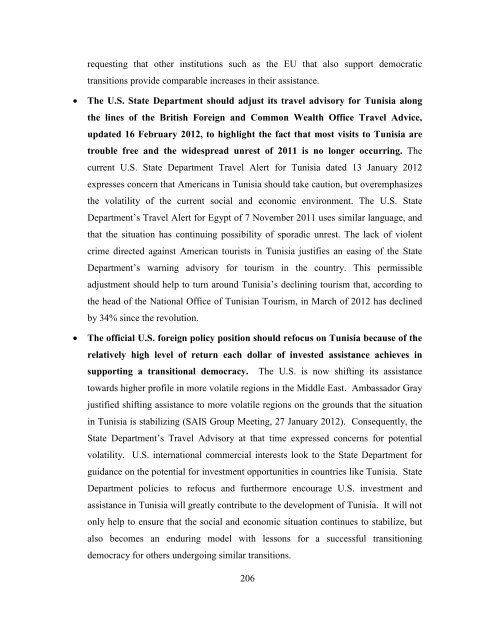Tunisia: Understanding Conflict 2012 - Johns Hopkins School of ...
Tunisia: Understanding Conflict 2012 - Johns Hopkins School of ...
Tunisia: Understanding Conflict 2012 - Johns Hopkins School of ...
Create successful ePaper yourself
Turn your PDF publications into a flip-book with our unique Google optimized e-Paper software.
equesting that other institutions such as the EU that also support democratic<br />
transitions provide comparable increases in their assistance.<br />
• The U.S. State Department should adjust its travel advisory for <strong>Tunisia</strong> along<br />
the lines <strong>of</strong> the British Foreign and Common Wealth Office Travel Advice,<br />
updated 16 February <strong>2012</strong>, to highlight the fact that most visits to <strong>Tunisia</strong> are<br />
trouble free and the widespread unrest <strong>of</strong> 2011 is no longer occurring. The<br />
current U.S. State Department Travel Alert for <strong>Tunisia</strong> dated 13 January <strong>2012</strong><br />
expresses concern that Americans in <strong>Tunisia</strong> should take caution, but overemphasizes<br />
the volatility <strong>of</strong> the current social and economic environment. The U.S. State<br />
Department’s Travel Alert for Egypt <strong>of</strong> 7 November 2011 uses similar language, and<br />
that the situation has continuing possibility <strong>of</strong> sporadic unrest. The lack <strong>of</strong> violent<br />
crime directed against American tourists in <strong>Tunisia</strong> justifies an easing <strong>of</strong> the State<br />
Department’s warning advisory for tourism in the country. This permissible<br />
adjustment should help to turn around <strong>Tunisia</strong>’s declining tourism that, according to<br />
the head <strong>of</strong> the National Office <strong>of</strong> <strong>Tunisia</strong>n Tourism, in March <strong>of</strong> <strong>2012</strong> has declined<br />
by 34% since the revolution.<br />
• The <strong>of</strong>ficial U.S. foreign policy position should refocus on <strong>Tunisia</strong> because <strong>of</strong> the<br />
relatively high level <strong>of</strong> return each dollar <strong>of</strong> invested assistance achieves in<br />
supporting a transitional democracy. The U.S. is now shifting its assistance<br />
towards higher pr<strong>of</strong>ile in more volatile regions in the Middle East. Ambassador Gray<br />
justified shifting assistance to more volatile regions on the grounds that the situation<br />
in <strong>Tunisia</strong> is stabilizing (SAIS Group Meeting, 27 January <strong>2012</strong>). Consequently, the<br />
State Department’s Travel Advisory at that time expressed concerns for potential<br />
volatility. U.S. international commercial interests look to the State Department for<br />
guidance on the potential for investment opportunities in countries like <strong>Tunisia</strong>. State<br />
Department policies to refocus and furthermore encourage U.S. investment and<br />
assistance in <strong>Tunisia</strong> will greatly contribute to the development <strong>of</strong> <strong>Tunisia</strong>. It will not<br />
only help to ensure that the social and economic situation continues to stabilize, but<br />
also becomes an enduring model with lessons for a successful transitioning<br />
democracy for others undergoing similar transitions.<br />
206
















